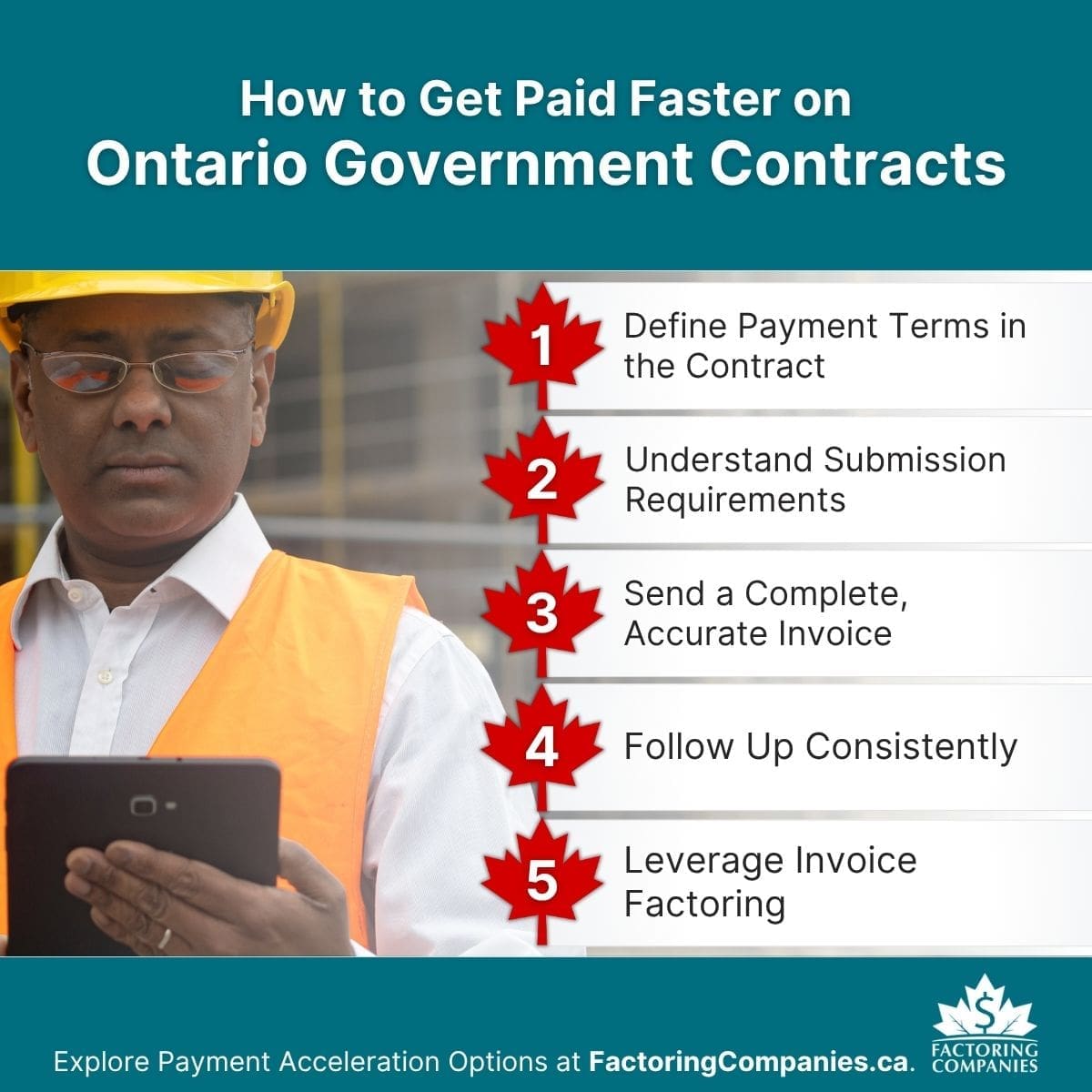
If your business supplies goods or services to the Government of Ontario, knowing when to expect payment is key to managing your cash flow. While public sector contracts can offer stability, payment practices for government contractors vary across Canadian provinces, and Ontario follows its own procurement rules and approval processes. This guide explains what to expect when working with the province and how to keep payments on track.
Typical Payment Terms for Government Contractors in Ontario
Ontario’s procurement activities are guided by the Broader Public Sector (BPS) Procurement Directive, which applies to ministries, provincial agencies, and certain publicly funded organizations. While the directive sets standards for competitive procurement and contract management, it does not impose a universal payment timeline for all vendors.
In most cases, provincial contracts follow a net 30 approach, meaning payment is generally made within 30 calendar days after both receiving your invoice and formally accepting the goods or services. The payment clock typically starts from the later of these two events.
An important exception applies to construction-related work. Under Ontario’s Construction Act, the province must pay a “proper invoice” within 28 calendar days, unless payment is disputed. These prompt payment rules apply to many construction contracts and are supported by adjudication processes to resolve disputes quickly.
Interest on overdue payments is not applied automatically outside of the Construction Act framework. To claim it, your contract must include a clause specifying the rate and conditions. Without it, the province has no obligation to pay interest on late amounts.
Because payment timelines can vary widely by contract type, it is important to confirm the exact terms before work begins.
Common Reasons for Ontario Government Contract Payment Delays

Even with net 30 terms, or the 28-day requirement under the Construction Act for applicable contracts, payments can take longer than expected. Delays often come from departmental processes, missing information, or invoice disputes.
Invoicing and Approval Delays
- Incorrect Submission: Sending invoices to the wrong contact, ministry, or agency can stop them from entering the payment queue.
- Incomplete Information: Missing purchase order numbers, reference codes, or descriptions can cause an invoice to be returned for correction.
- Department-Specific Workflows: Each department or agency may have its own approval path before payment can be released.
Documentation Gaps or Discrepancies
- Mismatched Records: Differences between your invoice, the purchase order, or delivery confirmations can lead to manual reviews.
- Unverified Deliverables: Payments may not begin processing until the goods or services are confirmed as delivered and accepted
- Change Orders without Documentation: Adjustments to the scope of work that lack proper written authorization can slow down approvals.
Delays in Acceptance of Goods or Services
- Late Sign-Off: Payment clocks, including the Construction Act’s 28-day window, do not start until a “proper invoice” or acceptance is confirmed.
- Multiple Reviewers: Some projects require multiple layers of approval before acceptance is finalized.
Internal Processing Cycles
- Batch Payment Runs: Many departments process payments on set schedules, so missing a cut-off date can extend the timeline.
- Staffing Constraints: Vacations, vacancies, or high workloads within Accounts Payable or project teams can create bottlenecks.
How to Get Paid Faster on Government Contracts in Ontario

While you cannot control every stage of the province’s internal payment process, you can take steps to help your invoices move through without unnecessary delays.
Define Payment Terms in the Contract
- Confirm the Timeline: Make sure your contract specifies when payment is due after invoice receipt or acceptance, and note if the Construction Act’s 28-day rule applies.
- Include Interest Clauses: If interest on late payments is important to your business, outline the rate and conditions in writing.
- Clarify the Trigger for Payment: Ensure it is clear whether payment is based on the date the invoice is received or the date goods or services are accepted.
Understand Submission Requirements
- Know the Right Contact and Process: Identify the ministry or agency contact who will receive and approve your invoice.
- Use the Correct Submission Method: Some departments require email submission, others use a vendor portal. Confirm this in advance.
- Verify Documentation Needs: Check if proof of delivery, acceptance forms, or specific reference numbers must be attached.
Send a Complete, Accurate Invoice
- Match All Details: Align every line item with the purchase order and contract terms.
- Attach Required Supporting Files: Include delivery confirmations, change order approvals, or other necessary documentation.
- Double-Check Before Sending: Errors or missing information can reset the approval process.
Follow Up Consistently
- Confirm Receipt: Ensure your invoice was received and entered into the system.
- Request Status Updates: If a due date is approaching, especially under the Construction Act, check that it is on track for payment.
- Address Issues Quickly: Respond promptly to any requests for clarification.
Factoring Invoices for Ontario Government Contractors
Ontario government payments can take weeks or even longer for certain projects to be released, even when you follow every requirement. You can turn those invoices into immediate working capital with accounts receivable factoring, so it’s easier to cover payroll, purchase materials, and keep operations running smoothly while waiting for the province to pay.
How Factoring Works for Government Contractors in Ontario
With factoring for government contractors, you sell your invoice to a factoring company, which advances most of its value, often within one to two business days. The factor then collects payment from the province when it comes due. Because Ontario’s ministries and agencies are generally reliable payers, qualifying for factoring is easy, and you’ll likely receive very attractive rates.
Benefits of Factoring for Ontario Contractors
- Reliable Cash Flow: Access funds quickly without taking on new debt, giving you the freedom to handle day-to-day expenses.
- Easier Approval: Factors evaluate the government’s creditworthiness, so even newer contractors can qualify.
- Scalable Funding: Factor a single invoice using spot factoring or factor multiple contracts and invoices, depending on your needs.
- Capacity to Grow: Take on larger or more frequent contracts without worrying about delayed payments.
Types of Ontario Government Contractors That Leverage Factoring
Many industries benefit from government contractor factoring to bridge payment cycles on provincial work.
- Construction and Infrastructure Firms: Large-scale projects like road expansion, bridge work, and public facility upgrades can tie up capital for months, which makes factoring for construction companies a practical funding tool.
- Transportation and Logistics Providers: Contracts for delivering goods, equipment, or specialized freight for ministries often require fuel and maintenance upfront, which is why many use factoring for trucking companies to maintain steady operations.
- Healthcare Staffing Agencies and Medical Suppliers: Supplying hospitals, clinics, or health agencies under Ontario Health contracts can involve extended payment cycles. This makes healthcare factoring solutions a valuable resource for covering payroll and inventory costs.
- Facility Maintenance and Janitorial Companies: Ongoing cleaning, waste management, and building upkeep for provincial facilities often lead contractors to use factoring for janitorial service companies to bridge the gap between service and payment.
- Security Services: Guarding courthouses, transit hubs, and public events for the province can require significant staffing investments, which is why factoring for security guard companies is a common choice.
- Technology and IT Service Providers: Delivering hardware, software, or IT support for government systems can stretch cash flow, which makes factoring for technology companies an often indispensable solution.
- Professional and Technical Services Firms: Engineering, consulting, and project management businesses engaged on provincial projects often choose factoring for consultants to keep work progressing while awaiting payment.
Accelerate Your Ontario Government Contractor Payments with Invoice Factoring
When payment timelines stretch beyond your comfort zone, factoring can put most of your invoice value in your hands within days. With quick approvals and flexible terms, it is an easy way to keep projects on schedule. To explore your options, request a free rate quote.
Editor’s Note: Please note that every effort has been made to ensure the accuracy of the information provided, and links to policies are included for your reference. However, contract terms are set by individual jurisdictions and are subject to change. Be sure to check with relevant regulatory bodies and your contract as needed.
FAQs on Ontario Government Contract Payment Terms
Are late payments from the Ontario government subject to interest?
Interest is not applied automatically. Outside of the Construction Act, your contract must include a clause specifying the rate and conditions to claim it.
How can I avoid payment delays on public contracts in Ontario?
Send invoices to the correct contact using the required method, ensure all purchase order numbers and documentation are complete, and confirm departmental procedures in advance.
Can I get paid faster if my invoice is delayed?
Yes. Ontario contractors can use factoring to receive most of the invoice value upfront while the province completes its payment process.
Does Ontario have prompt payment laws for government contractors?
Yes. The Construction Act requires payment within 28 days for proper invoices on most construction projects, with adjudication available for disputes. Other contract types follow agreed terms.
How long does it take to get paid on a government contract in Ontario?
Standard contracts are often paid within thirty days of acceptance. Construction Act-covered projects follow the 28-day rule, but internal reviews or disputes can extend timelines.
How can I find a factoring company that serves Ontario government contractors?
Factoring Companies Canada can match you with a factoring company that works with Ontario government contractors. Tell us a little about your business to get started.

About Factoring Companies Canada
Related Insights
Get an instant factoring estimate
Factoring results estimation is based on the total dollar value of your invoices.
The actual rates may differ.
CLAIM YOUR FREE FACTORING QUOTE TODAY!
PREFER TO TALK?
You can reach us at
1-866-477-1778
Get an instant factoring estimate
Factoring results estimation is based on the total dollar value of your invoices.
The actual rates may differ.
CLAIM YOUR FREE FACTORING QUOTE TODAY!
PREFER TO TALK? You can reach us at 1-866-477-1778











